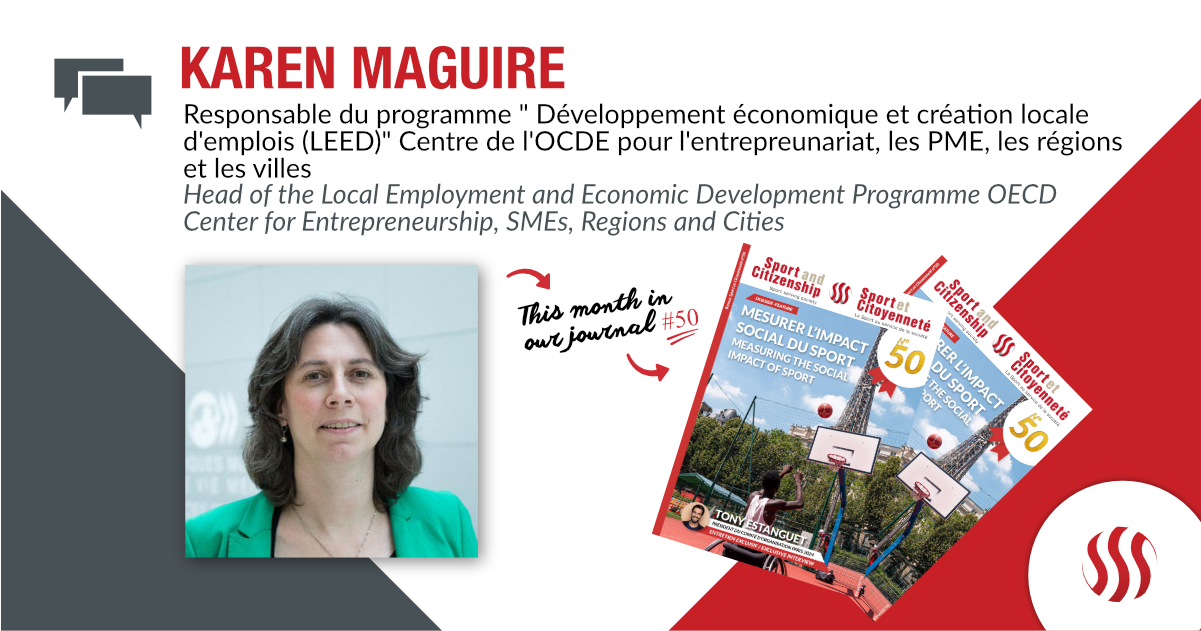
Global sporting events and local development: boosting social impact
Global sporting events and local development: boosting social impact
COVID-19 has brought global sporting events to a halt this past year, the most emblematic postponement being the Summer Olympic Games Tokyo 2020. In addition to the lost economic impact of global sporting events in terms of revenues and jobs, there is a missed opportunity for wider social impacts.
 Karen MAGUIRE
Karen MAGUIRE
Head of the Local Employment and Economic Development Programme
OECD Centre for Entrepreneurship, SMEs, Regions and Cities
Global sporting events are increasingly expected to achieve direct and indirect positive social impacts.
The economic activities and public investments associated with hosting a global sporting event can trigger a range of broader social impacts. Tourism to traditionally underserved places can bring new economic activity and jobs to those who need them. Well-targeted transport investments not only serve the event but can help people more easily access jobs in the future. Construction, products and services procurement can include requirements to train or hire disadvantaged groups. Urban regeneration plans may further help residents in terms of access to new housing or improved quality of life.
Different forms of inclusion are also being promoted through direct measures. This inclusion concerns socio-economic status, gender, sexual orientation, ethnic and national origin, people who experience disabilities, and beyond, through the event itself and its associated activities.
A wide range of other “intangible” benefits are frequently sought as part of the rationale for hosting. They include considerations such as civic pride, diplomacy (an important element of the PyeongChang 2018 Olympic Winter Games), or a sense of community.
Of course, minimising potential negative impacts are also part of the package. These range from environmental considerations to human rights for labourers involved in event-related activities.
Enhancing participation in sports more generally is a commonly sought goal
One of the most frequently sought social impacts from global sporting events is increasing sports participation in the broader population. The mental and physical health benefits of sports and exercise for all age groups are well documented. Sports participation can also reinforce other social goals such as inclusion, gender equity, enhanced leadership skills and even better school performance. How do the events boost that participation ?
“Bringing long-term impact well beyond the buzz during the event itself”
First, the spotlight on sports around these events can inspire people to start or increase their participation in sports. This result can be due to a range of effects, from the inspiration by particular sport role models, the desire to be part of the event in some way, or simply renewed motivation to practice sports.
Second, different promoters of sports such as clubs, federations, grassroots associations and even schools may boost their outreach to engage people in sport. Beyond one-off funding, helping build their management capacity brings long-term impact well beyond the buzz during the event itself.
Third, sport venues are constructed or modernised. While construction of new large infrastructure projects have their own set of challenges, the event brings public attention and resources to build or renovate sports facilities. This can go beyond the “star” infrastructure, reaching other facilitates that will serve a much wider group of sports users for years to come.
The OECD has developed standards for global events to help increase their social impact
The Organisation for Economic Co-operation and Development (OECD) is an international organisation that seeks to shape policies that foster prosperity, equality, opportunity and well-being for all. Together with governments, policy makers and citizens, it works on establishing evidence-based international standards and finding solutions to a range of social, economic and environmental challenges.
Global events can have big impacts in the communities where they take place, and beyond, but only with intentional planning, design and follow-up. That is why the OECD issued an international standard in 2018, the OECD Recommendation on Global Events and Local Development. This Recommendation helps countries, event hosts and civil society to work together to build positive long-term economic, social and environmental impacts and reduce any potential negative impacts. In addition to the principles and practical toolkit the OECD has developed as part of this Recommendation, it also works directly with event hosts in their efforts to maximise local impact.
More skills and tools are required to make this social impact happen”
What are some of the best practices used to boost these social impacts?
- Bid to host based on a comprehensive assessment of what different economic, social and environmental benefits could be, including independent review of these assessments.
- Align the event with existing broader local and regional development plans so that investments benefit each other, and not work at cross-purposes, with this social impact in mind.
- Plan upfront for the event legacy impacts, involving the public and private sector along with civil society—i.e. all those who will make the impacts happen.
- Make strategic use of public procurement for social impact, with realistic expectations and follow-through.
- Measure, monitor, evaluate and shift course as needed to keep the focus and achieve the desired social impact, keeping this system simple enough to be useable.
When public health conditions permit, global sporting events will be back. COVID-19 will only raise the bar on the expectations for social impact—including health. The global community of those involved will increasingly require the skills and tools make this social impact happen.
